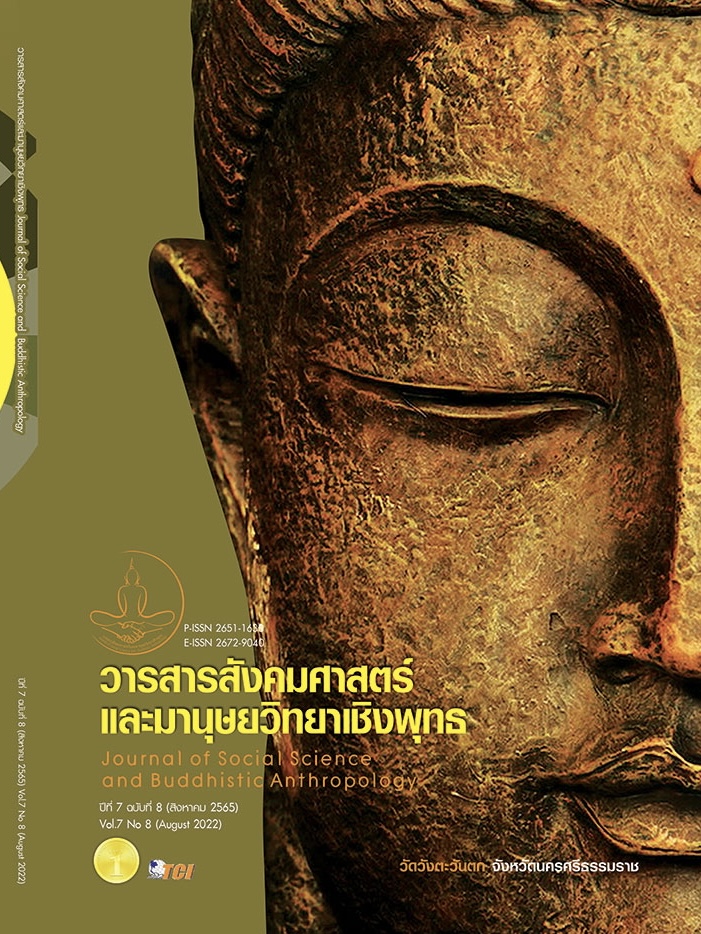THE MODEL DEVELOPMENT COMPETENCY LEARNING DESIGNERS TO TEACHER BY INTEGRATING ACTIVE LEARNING
Keywords:
The Model Development Competency, Integration Learning Designers, Active LearningAbstract
The objectives of this research article were to 1) studied basic data in the development competency learning designers to Teacher; 2) organized and evaluated the quality of the development competency learning designers to Teacher ; and 3) studied the results of the development competency learning designers to Teacher. It was designed using Mixed Methods design methodology. The sample group used in this research consisted of 150 teachers in the Teacher Professional Experience Network School. The research tools are the pattern of competency learning, test about knowledge and understanding of competency learning for teacher : the multiple choice test. The evaluation form to evaluate the ability of learning design. The evaluation form of lesson plan writing. The collected data were analyzed by using percentage, average, standard deviation, T - test dependent, and T - test one sample. 1) Teachers' learning design needs to provide training that promotes learning design that defines techniques, methods and teaching styles that teachers have actually implemented. and lead to writing a learning management plan. 2) The results of the developed learning pattern was in high quality level ( = 4.29, S.D. = 0.29). 3)The experimental results in using competency learning shows that Knowledge and understanding to learning design of teachers after learning were statistically higher than before learning at .05. The ability of learning activities design of teacher were statistically higher than the criteria of at .05. The ability of lesson plan writing of teacher were statistically higher than the criteria of at.05.
References
กมลวรรณ สุภากุล. (2559). การจัดการเรียนการสอนแบบ Active learning เพื่อให้ผู้เรียนรู้จริง. นครสวรรค์: มหาวิทยาลัยราชภัฏนครสวรรค์.
กานต์ อัมพานนท์. (2561). การพัฒนารูปแบบการเรียนรู้เชิงรุกที่ส่งเสริมทักษะการคิด วิชาความเป็นครูสำหรับนักศึกษาคณะครุศาสตร์ มหาวิทยาลัยราชภัฏเพชรบูรณ์. วารสารราชภัฏเพชรบูรณ์สาร, 20(2), 34-22.
เกรียงศักดิ์ เจริญวงศ์ศักดิ์. (2559). อนาคตใหม่ของการศึกษาในยุค Thailand 4.0. เรียกใช้เมื่อ 1 ตุลาคม 2564 จาก http://www.li.mahidol.ac.th/conference2016 /thailand4.pdf
ฉลอง ทับศรี. (2554). การออกแบบการเรียนการสอน (Instructional Design). ชลบุรี: ภาควิชาเทคโนโลยีทางการศึกษา คณะศึกษาศาสตร์ มหาวิทยาลัยบูรพา.
ดิเรก พรสีมา. (2554). แนวทางการพัฒนาวิชาชีพครู. กรุงเทพมหานคร: สำนักงานเลขาธิการสภาการศึกษา.
พรรณี ปานเทวัญ. (2559). การพัฒนาผู้เรียนในศตวรรษที่ 21 กับการเรียนรู้เชิงรุกในวิชาชีพพยาบาล. วารสารทหาร, 17(3), 17-24.
ยุภาลัย มะลิซ้อน และกาญจน์ เรืองมนตรี. (2563). การพัฒนาสมรรถนะครูด้านการจัดการเรียนรู้เชิงรุกในสถานศึกษาสังกัดสำนักงานเขตพื้นที่การศึกษาประถมศึกษามหาสารคาม เขต 2. วารสารมหาจุฬานาครทรรศน์, 7(8), 16-18.
รัตนะ บัวสนธ์. (2551). การวิจัยและพัฒนานวัตกรรมการศึกษา. พิษณุโลก: มหาวิทยาลัยนเรศวร.
ราชกิจจานุเบกษา. (2556). ข้อบังคับคุรุสภา ว่าด้วยจรรยาบรรณของวิชาชีพ พ.ศ. 2556.เล่มที่ 130 ตอนพิเศษ 130 ง หน้า 72 4 ตุลาคม 2556.
สมจิตร จันทร์ฉาย. (2557). การออกแบบและการพัฒนาการเรียนการสอน. นครปฐม: มหาวิทยาลัยราชภัฏนครปฐม.
อุบลวรรณ ส่งเสริม. (2555). การพัฒนากระบวนการจัดการเรียนการสอนเพื่อพัฒนาความสามารถในการเขียนแผนการจัดการเรียนรู้สำหรับนักศึกษาครู. วารสารศึกษาศาสตร์, 9(2), 115-127.
Hiemstra, R., et al. (1991). Self-directed adult learning. New York: Chapman and Hall.
Larisey, M. M. (1994). Student self-assessment: A tool for learning. Adult Learning, 5(6), 9-10.
McKinney, K. & Heyl, B., (Eds.). (2008). Sociology Through Active Learning(2nd ed.). Thousand Oaks, California: SAGE/Pine Forge Press.
Smith, P. L. & Ragan, T. J. (1999). Instructional design (2nd ed.). New Jersey: Prentice- Hall.
Downloads
Published
How to Cite
Issue
Section
License
Copyright (c) 2022 Journal of Social Science and Buddhistic Anthropology

This work is licensed under a Creative Commons Attribution-NonCommercial-NoDerivatives 4.0 International License.









